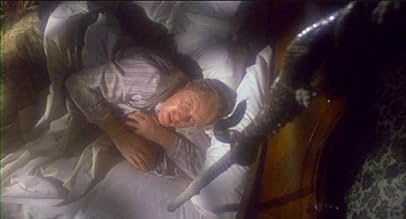Adicionar um enredo no seu idiomaTo treat his friend's cocaine induced delusions, Watson lures Sherlock Holmes to Sigmund Freud.To treat his friend's cocaine induced delusions, Watson lures Sherlock Holmes to Sigmund Freud.To treat his friend's cocaine induced delusions, Watson lures Sherlock Holmes to Sigmund Freud.
- Direção
- Roteiristas
- Artistas
- Indicado a 2 Oscars
- 1 vitória e 5 indicações no total
Avaliações em destaque
The movie takes the liberty of assuming that all of Dr. Watson's accounts of Sherlock Holmes are true, except for one. That would be "The Final Problem", in which the great detective supposedly dies at the hands of his arch-enemy Professor Moriarty. The movie suggests that this story is merely a cover up for a period in time in which Holmes was getting help with his cocaine addiction from none other than famous psychiatrist Sigmund Freud.
The settings and characters ring true to both Doyle's mysteries and the Sydney Paget illustrations that accompanied them. Sherlock Holmes' deerstalker and cloak, though never mentioned by Doyle, look more like Paget's illustrations than ever before, more rugged than in most film interpretations. American actor Robet Duvall, despite sometimes struggling with the British accent, portrays Watson as an intellectually and physically fit comrade for Holmes, not a bumbler. Laurence Olivier's Prof. Moriarty matches the vision of Doyle and Paget rather than the cliché mustache twirler of other movies. Only now, Moriarty isn't really a criminal mastermind. He's Holmes' childhood math tutor.
Alan Arkin depicts Freud as a man of intelligence, insight, and above all, honor.
The inclusion of lesser known characters like Mycroft Holmes and Toby is a plus. There are also references, both direct and sly, to canonical Holmes stories.
While Nicol Williamson's performance as Sherlock Holmes lacks the vigor and spark of Basil Rathbone or Christopher Plummer, Williamson succeeds in showing Holmes as a troubled individual rather than a god. The movie mixes drama, subtle humor, mystery, and even action, finally showing Holmes as the capable fighter he was in the canon. The end of the film strays from the books in order to explore the uncharted territory of Holmes' childhood, providing a deeply moving climax.
This may come truer to Sir Arthur's original vision than any other pastiche written for film so far, largely thanks to the efforts of writer/director Nicholas Meyer. It's obvious in every scene that Meyer has a great love for the writings of Arthur Conan Doyle.
In order to cure his friend of his cocaine addiction, Dr. Watson (Robert Duvall) and brother Mycroft create a ruse to get Holmes to Vienna where Holmes(Nicol Williamson) meets Dr. Sigmund Freud (Alan Arkin). Arkin's Dr. Freud shows his own skills as a detective in a plot involving a kidnapped singer (Vanessa Redgrave).
Holmes and Freud work very well togeather. Freud points out that as a doctor he uses many of the same skills that Holmes uses in fighting crime, and in one scene demonstrates the same powers of observation and reasoning, while being careful not to upstage the great detective. There is not much mystery here, but the chemistry between Holmes and Freud keeps the movie interesting.
The clever twist concerns Holmes' archenemy Prof. Moriaity. Here we see Moriarty not as the villian, but as a timid schoolteacher harassed by Holmes because of a dark event in the lives of Sherlock and Mycroft.
This is a movie that is good fun. The only problem is that Dr. Watson isn't used very well. Freud makes a much better partner to Holmes.
Você sabia?
- CuriosidadesWhile the book showed Dr. Sigmund Freud with a daughter, the child he had in real life, the movie showed him with a make-believe son, because Dr. Anna Freud threatened a lawsuit if she was included. Since her father was dead, she had no control over how he was portrayed.
- Erros de gravaçãoFreud accuses Holmes of being "egocentric". However, the use of the term ego (Latin for "I") was not used by Freud until 1920, and the psychological adjective "egocentricity" did not exist until after Freud established the concept of the ego, id, and superego in his paper "The Ego and the Id" in 1923.
- Citações
Sigmund Freud: Who am I that your friends should wish us to meet?
Sherlock Holmes: Beyond the fact that you are a brilliant Jewish physician who was born in Hungary and studied for a while in Paris, and that certain radical theories of yours have alienated the respectable medical community so that you have severed your connections with various hospitals and branches of the medical fraternity, beyond this I can deduce little. You're married, with a child of... five. You enjoy Shakespeare and possess a sense of honor.
- Cenas durante ou pós-créditosIn the opening titles, there are footnotes concerning many of the characters.
- Versões alternativasIn some airings on television, the "Madame's Song" (aka "I Never Do Anything Twice") is cut.
Principais escolhas
- How long is The Seven-Per-Cent Solution?Fornecido pela Alexa
Detalhes
- Data de lançamento
- Países de origem
- Idiomas
- Também conhecido como
- El caso final
- Locações de filme
- Empresas de produção
- Consulte mais créditos da empresa na IMDbPro
Bilheteria
- Orçamento
- US$ 5.000.000 (estimativa)







































